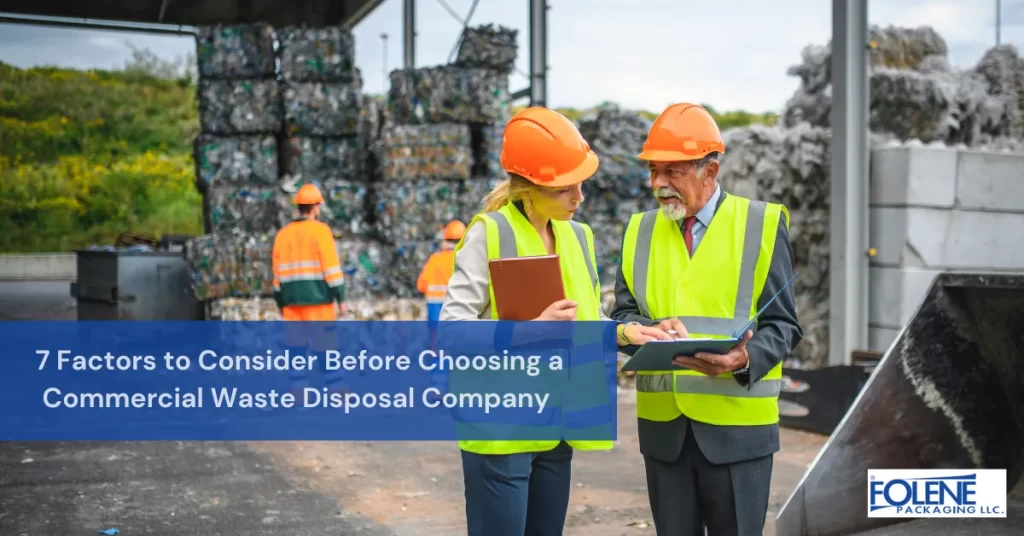
Dealing with commercial waste most efficiently is one of the most significant goals for a manufacturer, after goals relating to profitability. Manufacturers and suppliers are often highly concerned about whether the company’s waste is disposed of while adhering to local, national, and international policies and regulations.
Commercial waste disposal is also frequently in the news, and customers observe whether companies behave responsibly regarding waste materials. This means that businesses must constantly recalibrate their efforts to dispose of waste correctly to meet evolving customer demands regarding environmental compliance.
What is Commercial Waste Disposal?
Commercial waste is the waste and trash generated by an active business or company. This includes any waste produced on the premises. Once products leave the manufacturers, as the situation stands now, disposal of packing and other waste from the products becomes the obligation of the next in line on the supply chain. Over the next few years, this status quo in waste removal obligation will be increasingly shared among manufacturers and suppliers with the development of extended producer responsibility.
Commercial waste does not include household, agricultural, or industrial waste. Special rules and laws apply to commercial waste disposal for all commercial enterprises, non-hazardous and hazardous.
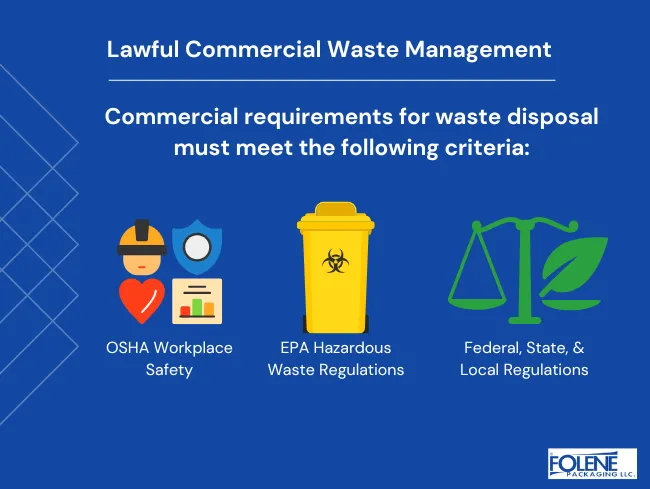
Enterprises That Commonly Require Commercial Waste Management
Commercial waste can be generated from the following places, for example:
any site where trading takes place
offices
sports and recreation centers
factories
packaging plants
not-for-profit organizations
stores
restaurants
warehouses
nonmanufacturing waste from industrial facilities
other businesses
How it is Lawful to Dispose of Waste in The U.S.
With the increasing regulations in the trash disposal arena, people ask how it is lawful to dispose of waste and avoid fines or other legal issues.
The answer is that what makes waste disposal lawful or not is how it is done. Since the regulations are complex and change frequently, using registered commercial waste management companies is a wise decision. Recycling, incineration, composting, and sending to a landfill are legal ways for disposal of solid waste.
Commercial waste regulations are more stringent than those for domestic waste. Commercial enterprises must comply with:
EPA regulations for hazardous waste
OSHA regulations for workplace safety and
State and local regulations for waste disposal and commercial recycling.
Regulations have been guided and entered into law with the Solid Waste Disposal Act (SWDA) of 1965 and the Resource Conservation and Recovery Act (RCRA) of 1976.
Industrial waste disposal requires special conditions, such as construction debris, highly hazardous waste, and “universal waste.” The EPA waste category, known as universal waste, refers to hazardous waste that is commonly generated and poses a lower immediate risk to people and the environment. Universal waste disposal applies to batteries, some pesticides, and aerosol cans, among others, and follows an alternative set of regulations with longer storage time permitted.
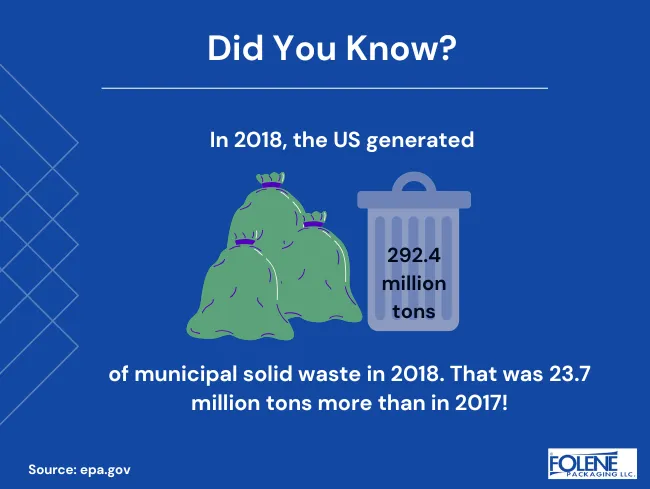
7 Problems Companies Encounter in Commercial Waste Disposal
Waste services can also encounter hiccups. These are some of the most common problems people face with commercial waste disposal management.
Missed trash pick-ups cause accumulation of waste material and visual pollution.
A shortage of space in waste dumpsters causes trash to overflow on or around the dumpster.
Poor service means that dumpsters are damaged or not emptied completely
Illegal dumping by other parties at private waste containers
Container sizes and service frequency do not match the customers’ unique needs
Inefficient commercial trash sorting and segregation increases waste disposal costs and impedes recycling efforts.
Incorrectly sorted trash or delays in pick-up encourage pollution from carbon emissions that damage ecosystems and harm wildlife.
5 Types of Commercial Waste Disposal for Business
Haulla, a waste collection company, identifies 5 main categories of waste, which we will discuss below. Discussing these types of waste makes us ask: Is there a type of commercial waste software that can help us be aware of the quantities of waste we are generating?
Hazardous waste: Some examples are acids, toxic materials, and flammable liquids. Dangerous and toxic waste disposal could be solid or liquid waste that could harm our health or the environment.
Construction waste: Proper disposal prevents damage to the environment and injuries.
General waste: This includes paper and plastic packaging, printing paper, as well as food waste. Some of this can be recycled, but most of it ends up in landfills. Your Chief Sustainability Officer or sustainability team can discuss ways to reduce the amount of waste generated in this category.
Food waste: Due to our heightened sensitivity to food and health hygiene, food waste causes massive amounts of commercial waste. Entire batches of food production are sometimes slated for disposal at the slightest risk of contamination. Sources of food waste include restaurants, food marts and delis, and farms.
Clinical and medical waste: Hospitals, clinics, and R&D labs churn out used single-use plastic in the form of syringes, tubes, containers, bandages, and human tissue. Storage, transport, and disposal are subject to strict regulations – and could generate further waste as they are often sealed for hygiene and safety of the workers and wider population.
As companies determine where to dispose of each type of waste, they can improve the commercial waste disposal process. However, globally, we have yet to optimize that process.
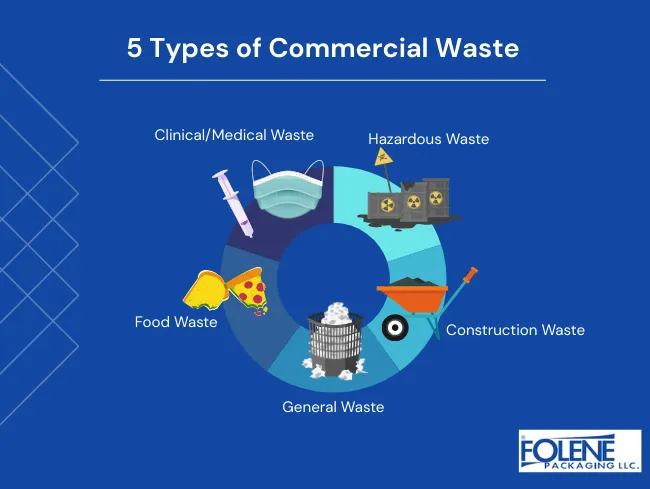
What are the responsibilities of a waste management company?
Disposal of solid waste management centralizes several waste disposal services. Some services are included in the price, and others are added to the cost.
Commercial waste disposal may include:
Waste removal services
Dumpster rental services
Roll-off container services for industrial waste
Compactor services for efficient waste collection and disposal
Recycling bins for easier separation of recyclable materials
Recycling collection and processing services
What 7 factors should you consider when choosing a commercial waste disposal company?
When choosing a commercial waste disposal company, check to see whether they offer the most important services and advantages that your enterprise needs:
Compliance with federal and state regulations—Is the company registered with a state business license, a sales tax permit, and a contractor’s license if your state requires it? Are they registered with the MOE (Ministry of Environment)? Are they registered with the Public Utilities Commission? Registration is very location-specific. For example, NYC requires companies to have a Trade Waste Removal License.
Consider what type of waste you generally need to dispose – Does this company specialize in certain kinds of waste? Do they restrict or reject certain types of waste? What are the rules for organic waste? Yard waste? Does the company accept both hazardous and non hazardous waste?
Pricing – what’s the monthly cost? Is it a variable cost or a fixed cost? What are the additional costs? Do you have to pay for containers? Do they provide the bins, or must you buy them yourself? Compare the cost to the amount collected between several companies.
Frequency—Are commercial waste pick-ups frequent enough for the amount of waste your company produces? Do they offer customized waste collection schedules?
Capacity – Are you limited in how much trash you can generate? Are the container sizes restricted?
Reliability – Look for positive and negative reviews about potential companies. Note reviews that mention reliability (or disappointment in failure), quality of service, and satisfaction with the price point.
Recycling services offered – Do they include a variety of containers for recycling different materials? Is that service included in the price? Is the company run in an environmentally responsible manner?
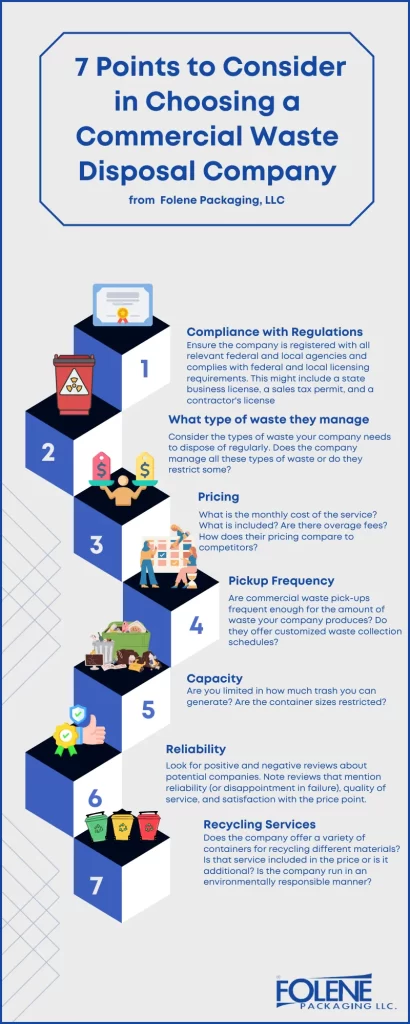
5 Top Commercial Waste Management Strategies
1. Choose Your Commercial Waste Management System Carefully
Choose a commercial waste company with positive reviews. See above. Make sure that the company offers the services you need. If possible, find a company that is easy to work with and is a leader in environmental services.
2. Identify Waste Streams in Your Commercial Waste
Use commercial waste software that tracks the types of waste a commercial enterprise produces.
3. Produce Less Waste for Commercial Waste Collection
Discover what changes could make waste reduction possible. Instead of using bulky packaging, request that your raw materials be sent in economical wrapping such as shrink wrap.
4. From Paying for Commercial Waste Collection to Profitable Recycling
Companies can make some income by recycling. RecycleCoach points out that 2,000 pounds of cardboard can be redeemed for up to $80. Alternatively, cash in on your contribution to the over 50 million metric tons of e-waste generated annually by selling devices the company wishes to dispose of directly on eBay, Craigslist, Facebook Marketplace, or Gazelle. Remember, one person’s trash is truly another person’s treasure. Some companies cover the cost of unavoidable waste disposal by recycling whatever they can.
5. Educate Your People About What Happens to Commercial Waste
Teach all your employees and workers about the wider picture of commercial waste. From which commercial waste containers are suitable for which trash to developing an entire system at your enterprise, such as this 10-step action plan for a recycling program at work.
How using Folene Packaging’s shrink wrap can reduce bulky packaging waste
Waste management is an essential aspect of any business, regardless of the size or industry. Disposal of waste can be expensive, but with thinking ahead and awareness of strategies to reduce the mass of trash, business owners can save money. Folene Packaging offers manufacturers, suppliers, and distributors strong, glossy polyolefin shrink wrap for packaging. Using shrink wrap instead of cardboard or wooden packaging can save a large amount of packaging mass for you and your customers—the next link in the supply chain.
Tell your business customers how you will save money on commercial waste disposal by switching to shrink film. This could be part of a wider recycling program to become more environmentally conscious.
Explore our full range of shrink packaging films yourself or reach out to a Folene Packaging representative to find which one of our full range of products is most suitable for your products. By making the switch to lightweight, space-effective shrink packaging, you may be able cut down on the bulk of your commercial waste disposal needs.
Commercial Waste Disposal FAQs
What are the differences between commercial waste disposal and other waste disposal?
Several differences make commercial waste disposal more complex than household or universal waste disposal. Commercial dumpsters are bigger and heavier than domestic bins, requiring careful placement of dumpsters and specialized collection vehicles. Commercial waste is collected by a tendered waste management company monthly or biweekly, but not weekly. Commercial waste solutions must typically dispose of more commercial waste since it generally is greater in volume than domestic waste. Commercial waste management is usually more complex because more people and stages are involved.
Does a waste disposal & recycling center offer pick-up services?
Some waste disposal companies offer pick-up services. This is helpful for businesses that generate a lot of solid waste or for bulky/large items. There is usually an additional fee. You might have to fit in with the waste disposal and recycling center’s pick-up schedule.



